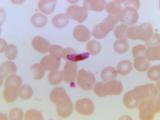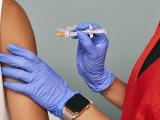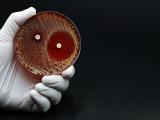Dec 13, 2011
Study finds flu vaccine does not increase sickle cell crises
Seasonal flu vaccination does not increase the risk of hospitalization for sickle cell disease among children who have the condition, researchers from Colorado and the US Centers for Disease Control and Prevention found. In their retrospective cohort study published in Pediatrics yesterday, the investigators analyzed data from children 6 months to 17 years old in eight Vaccine Safety Datalink managed-care organizations who had a diagnosis of sickle cell anemia from 1999 to 2006. Using matched case-control and self-controlled case studies, they examined the association between flu shots and hospitalization for sickle cell crisis in the 2 weeks after vaccination. Of 1,085 children with sickle cell anemia, they identified 179 who had at least one sickle cell crisis during any flu season. The researchers found non-significant odds ratios for hospitalization of 1.3 (95% confidence interval [CI], 0.8-2.2) in the matched case-control study and of 1.2 (95% CI, 0.75-1.95) in the self-controlled case series.
Dec 12 Pediatrics abstract
Study: Malaria raises risk of miscarriage in early pregnancy, but drugs can help
A long-term study from Thailand, billed as the largest of its kind, shows that malaria significantly increases the risk of miscarriage in the first trimester of pregnancy but that treating the disease with drugs is fairly safe and reduces the risk. In the study, funded in part by the Wellcome Trust, researchers examined 25 years' worth of medical records of women who attended the antenatal unit of the Shoklo Malaria Research Unit in Thailand, according to a Wellcome Trust press release. The study was published today in Lancet Infectious Diseases. Among the women, 16,668 had no malaria during pregnancy, while 945 had a single episode during their first trimester and no later episodes. In the absence of malaria, about 1 in 5 pregnancies ended in miscarriage. Symptomatic malaria increased the risk of miscarriage to 1 in 2 in pregnancies, and asymptomatic malaria raised the risk to 1 in 3. Among women who were treated for malaria (with or without symptoms), 26% miscarried following chloroquine, 27% following quinine, 31% following artesunate, and 24% follow artemisinin combination therapies (ACT). (ACT is contraindicated in the first trimester, but some women were treated with it inadvertently.) Dr. Jimmy Whitworth, head of international activities at the Wellcome Trust, said in the release, "These results . . . show that antimalarial treatment with standard first-line drugs reduces the risk of miscarriage in the first trimester. These findings are likely to change practice guidelines worldwide and to save the lives of many women and unborn children."
Dec 13 Lancet Infect Dis abstract
Dec 12 Wellcome Trust press release
Study: MMR vaccine reactions fairly common but not serious
The first dose of the measles, mumps, and rubella (MMR) vaccine given at 12 months of age can cause reactions that are typically mild, but that dose and the second dose of the vaccine may raise the risk of emergency room visits, according to Ontario researchers. Their self-controlled case series study was published yesterday in PLoS One. In Ontario the first two doses of MMR vaccine are recommended to be given at 12 and 18 months of age, whereas the US schedule calls for the first dose at 12 to 15 months and the second at 4 to 6 years. The scientists analyzed data from 271,495 12-month immunizations and 184,312 18-month immunizations. They found that, from 4 to 12 days after the first dose, 1 in 168 tots had a reaction, such as fever, compared with 1 in 730 after the second dose. Children in the first-dose group had a 1.33 increased relative risk of an emergency room visit (95% CI, 1.29-1.38), compared with 1.25 in the second-dose group (95% CI, 1.17-1.33). However, few of the reactions required hospitalization. Lead author Dr. Kumanan Wilson of the Ottawa Hospital Research Institute, quoted in a Canadian Press (CP) story yesterday, said the results in kids immunized with the live MMR vaccine are "expected and necessary. This is the immune system working."
Dec 12 PLoS One study
Dec 12 CP article
Move to contact precautions associated with risk of dementia
Moving a hospitalized patient into isolation and initiating contact precautions is associated with a higher incidence of delirium, according to a retrospective cohort study, but the study's authors cautioned that the act of isolation may not be the cause of the increase. Contact precautions are used to prevent the spread of hard-to-treat infections like methicillin-resistant Staphylococcus aureus. The investigators, from the University of Maryland School of Medicine, examined 2 years' worth of data on more than 45,000 patients at the university's medical center and determined that the risk of clinically defined dementia was 1.75 times higher among those who were isolated after admission but not among those isolated upon admission. "Patients in our study who were placed on contact precautions later in their hospitalization were generally sicker than those who were on contact precautions from the outset," said lead author Hannah Day in a press release from the Society for Healthcare Epidemiology of America (SHEA). "So it's possible that the underlying illness rather than the precautions themselves is responsible for the association with delirium."
Dec 7 Infect Control Hosp Epidemiol abstract
Dec 12 SHEA press release



















